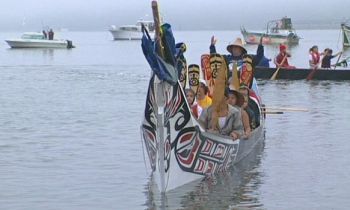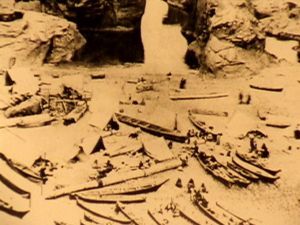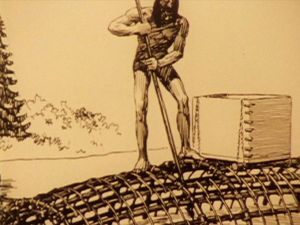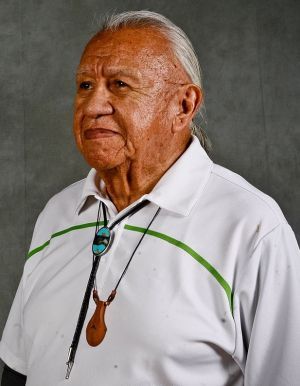
Publisher:
Bonnie King
CONTACT:
Newsroom@Salem-news.com
Advertising:
Adsales@Salem-news.com

~Truth~
~Justice~
~Peace~
TJP
Dec-13-2021 19:37

 TweetFollow @OregonNews
TweetFollow @OregonNews
What Kind of Actions Can Lead to Justice?
Robert Lundahl special to Salem-News.comAs early as the 1870's the fish were "dangerously over harvested."
 Chief Frank Nelson, Alert Bay, Vancouver Island, Canada. In one of his two family canoes, with Lower Elwha youth. Photo courtesies: Unconquering the Last Frontier, Song on the Water, except where noted. |
(LOS ANGELES, Calif.) - So begins the lesson plan provided by the Smithsonian Institution Museum of the American Indian about what became known as the "Fish Wars."
This comprehensive account addresses the failure of the State of Washington to recognize the provisions of a series of Treaties with Washington Tribes (the law of the land as the United States government saw it) which honored and codified traditional practices of Tribal Nations (in the United States' legal lexicon–Domestic Dependent Nations) who had not been conquered in war, nor in any other way ceded their rights as fully independent sovereign entities (nations).
This included the right to fish in usual and accustomed grounds, off reservation, as they had done since time immemorial.
However, as non native populations moved into the area, competition over access to fish and marine resources was fierce.
The settlers brought new technology like outboard motors for their boats, which extended their range of operations, sometimes catching the salmon and other fish before tribal fishermen could get to the offshore runs passing by or heading to local streams to spawn.
As noted in my film "Unconquering the Last Frontier," available publicly here, even as early as the 1870's the fish were "dangerously over harvested."
 This, alongside a ban on nets and traps (indigenous technologies) and the damming of rivers, supplanting fish passage with the then unproven and soon to be failed or failing practice of fish hatcheries, doomed the runs and left the people starving during the depression and before.
This, alongside a ban on nets and traps (indigenous technologies) and the damming of rivers, supplanting fish passage with the then unproven and soon to be failed or failing practice of fish hatcheries, doomed the runs and left the people starving during the depression and before.
On the Elwha, if the ranger caught an Indian with a fish in tow, that person would be sent to jail.
Many people had to move away from their reservations, take jobs in canneries (which were often racist and abusive–Unconquering the Last Frontier), poultry processing plants (Adeline Smith, Klallam), logging operations (Beatrice Charles, Klallam) "That's our trees they're cutting down" (Unconquering the Last Frontier), all of which had the effect of destroying the continuity of culture and communities.

While there is no mitigating the pain and loss accrued to tribes, this story of darkness and destruction does not necessarily end that way.
In the 1970s, a new generation of Native men and women, some Vietnam vets, better traveled and suffering from overwhelming trauma, had had enough.
There were even a few who had been to law school, like John Echohawk, founder of NARF (Native American Rights Fund–a Legal Support Practice). And tribal people began to assert their rights– fishing in traditional places, damn the consequences. And consequences there were.
Billy Frank Jr. From Wikipedia:
- Frank was first arrested at age fourteen while fishing on the Nisqually River, following a run in with game wardens in 1945.
The teenager had been fishing for salmon, and, while emptying his net, he was accosted by two wardens who shoved his face into the mud as he struggled. The tensions from the declining fish populations in the 1940s had begun to boil over.
The unregulated commercial boats and development of hydroelectric equipment had begun to take its toll on the salmon, and the white sportsmen laid the blame at the Native's feet.
 As the numbers of salmon continued to decline, in 1965 the pressure between Native and non-Native fishermen turned violent as women and children of the Nisqually tribe protested alongside the fishermen and several Natives were bloodied.
As the numbers of salmon continued to decline, in 1965 the pressure between Native and non-Native fishermen turned violent as women and children of the Nisqually tribe protested alongside the fishermen and several Natives were bloodied.
For Frank, the battle for the salmon was personal, treaty rights had to be recognized for not only the Native right to fish a guaranteed number of the salmon population, but the right to maintain ecosystems that would continue to guarantee a healthy yield of fish year after year.

Circling back around to today's Climate Crisis, we can see that our mutual requirements of survival and success in dangerous times are built on the backs of Native American leadership like Billy Frank Jr., the Niqually and other tribal people who figuratively and literally had their faces in the mud for over 100 years and had to fight their way back up.
Boldt Decision (US v. Washington), from Wikipedia:
- The Boldt Decision (from the name of the trial court judge, George Hugo Boldt), was a legal case in 1974 heard in the U.S. District Court for the Western District of Washington and the U.S. Court of Appeals for the Ninth Circuit.
The case re-affirmed the rights of American Indian tribes in the state of Washington to co-manage and continue to harvest salmon and other fish under the terms of various treaties with the U.S. government.
The tribes ceded their land to the United States but reserved the right to fish as they always had. This included their traditional locations off the designated reservations.
 As the time went by, the State of Washington had infringed on the treaty rights of the tribes despite losing a series of court cases on the issue.
As the time went by, the State of Washington had infringed on the treaty rights of the tribes despite losing a series of court cases on the issue.
Those cases provided the Indigenous peoples a right of access through private property to their fishing locations, and said that the state could neither charge the Indigenous peoples a fee to fish nor discriminate against the tribes in the method of fishing allowed.
Those cases also provided for the Indigenous peoples' rights to a fair and equitable share of the harvest. The Boldt decision further defined that reserved right, holding that the tribes were entitled to half the fish harvest each year.
In 1975, the Ninth Circuit Court of Appeals upheld Judge Boldt's ruling. The U.S. Supreme Court declined to hear the case. After the state refused to enforce the court order, Judge Boldt ordered the United States Coast Guard and federal law enforcement agencies to enforce his rulings.
On July 2, 1979, the Supreme Court rejected a collateral attack on the case, largely endorsing Judge Boldt's ruling and the opinion of the Ninth Circuit.
In Washington v. Washington State Commercial Passenger Fishing Vessel Ass'n, Justice John Paul Stevens wrote that "[b]oth sides have a right, secured by treaty, to take a fair share of the available fish."
The Supreme Court also endorsed Boldt's orders to enforce his rulings using federal law enforcement assets and the Coast Guard.
Flash forward to 2005 and the making of Song on the Water by Film Maker, Robert Lundahl. Tribal Journey to Tulalip. 60 minute documentary.

As Native Americans in the state of Washington had been forbidden from fishing in their traditional areas, off the reservations, when the Boldt Decision passed in the U.S. federal courts in 1976, the federal government guaranteed the rights to fish in “usual and accustomed grounds.” But the state often denied access.
Finally in a compromise, the state agreed to allow tribes to access traditional fishing grounds if they demonstrated they could access them by traditional means, ocean going canoes.
Lundahl’s award winning ethnographic documentary, “Song on the Water” (2005), takes viewers along with 50 indigenous canoes, their crews, and communities on a modern-day voyage to a traditional potlatch.
As anthropologist Collen Boyd of Bowling Green State University then observed,
- "Filled with beautiful photography and inspiring Coast Salish and Nuu Chah Nulth songs and cultural expressions, the one-hour film explores what the voyage means to the “pullers,” ground crews, and elders who share the waves, the traditions, and a vision of a positive future for Coast Salish youth."
With this backdrop, my second film, Song on the Water, offers a visual and visceral experience of hope and justice.

Produced and Directed by Robert Lundahl. Cinematography and Editing by Robert Lundahl. Location Sound, Paul Hawxhurst.
Presented by The Long House Association, Linda Wiechman, President. ©Copyright Robert Lundahl
Articles for December 13, 2021 | Articles for December 14, 2021
Quick Links
DINING
Willamette UniversityGoudy Commons Cafe
Dine on the Queen
Willamette Queen Sternwheeler
MUST SEE SALEM
Oregon Capitol ToursCapitol History Gateway
Willamette River Ride
Willamette Queen Sternwheeler
Historic Home Tours:
Deepwood Museum
The Bush House
Gaiety Hollow Garden
AUCTIONS - APPRAISALS
Auction Masters & AppraisalsCONSTRUCTION SERVICES
Roofing and ContractingSheridan, Ore.
ONLINE SHOPPING
Special Occasion DressesAdvertise with Salem-News
Contact:AdSales@Salem-News.com

googlec507860f6901db00.html



Terms of Service | Privacy Policy
All comments and messages are approved by people and self promotional links or unacceptable comments are denied.
[Return to Top]
©2025 Salem-News.com. All opinions expressed in this article are those of the author and do not necessarily reflect those of Salem-News.com.